- Home
- Kim Newman
The Quorum Page 11
The Quorum Read online
Page 11
I have days at the word-processor in my study - a posh name for the room I won’t let anyone else into. I often pretend to write but actually play computer games. With Colin Dale on as a serial and Ken Sington in production, I’m doing another in the series, Mai DaVale, which should be out this fall (we have American seasons in our house, sadly) and be on telly next year: Colin and Ken are girl-chasing in Book Three because Gin pestered me to write a part for her, and now her agent wants more money than the BBC can pay. I’ve threatened to hide her precious bubble-bath mix (a family recipe) until she gives in. I do a couple of hours’ light tappy-typing in the morning, aiming to get ten pages battered out, revise after lunch and bunk off to watch afternoon telly. I’m addicted to Aussie soaps and clever-clever quiz shows.
On office days, I cruise into the West End, where my production company has exorbitantly expensive premises, and crack-whip over highly-paid runners, assistants, secretaries, researchers and minions. On Mondays, I lock everyone into the boardroom and don’t let them out until they’ve come up with six hours’ worth of ideas. Then they beaver away setting them up until Wednesday afternoon, when I jettison things that aren’t working. This is accomplished with much bloodletting.
If I’m in town, I usually have lunch meetings with publishers, film people, potential guests or old mates. I have a girlie whose job it is to find new restaurants. My ambition is to eat in every place within a three-mile radius of Goodge Street, and live.
Fridays are hectic panic since the show goes out live in the evening. I can’t write, produce, present and direct, so someone sits in a box shouting orders at cameramen while I do battle under the lights. But Dixon’s On, whatever you think about it, is all my own work. I even composed the signature tune. People ask me who my favourite guest was and I have to say Peter Ustinov. I have to because he pays me a retainer, but actually my real ambition-of-a-lifetime was working with Tamsin.
We started with Channel 4 and I’ll always be grateful they gave me a chance after the Show We Do Not Name Out Loud, but Cloud 9 offers better facilities and access to international names than any of the terrestrial channels. Some of my mates criticised me at first for working for Derek Leech, but in my experience Derek’s done a lot of good in the business.
Most evenings, Gin and I are out at a first night or a movie premiere. Maybe even the same ones at the same time. People suspect we’re not just married because the wedding put us on the cover of Hello. Sometimes we’re so luvvy you could scream. We don’t often get a chance to eat out locally and I’m a bit teed-off with a nameless Curry House in Hampstead High Street who put a picture of me and Ginny in their window after we ordered a takeaway from them. Gin cooks like Scott Tracy acts, so I sometimes show off my culinary brilliance by whipping up ragout a la Michel.
Some weekends, we pile into one of the cars and boogie off to the country for a ramble. I grew up in a small town in Somerset and that has given me a deep and abiding attachment to Yorkshire.
• Michael Dixon presents Dixon’s On, Friday Cloud 9 (satellite). Colin Dale starts Sunday BBC1.
Radio Times, 9-15 January, 1993
6 JANUARY, 1993
Michael saw his fish-eye reflection in a mug of undiluted caffeine and fought an addict’s craving for fry-up. He looked at his Rolex (Christmas present). 8.52 a.m. Middle of the night.
‘My mummy told me,’ a shrill voice sing-songed, ‘if I was goody, that she would buy me a rubber johnny...’
Ginny was being difficult again. He didn’t need the distraction. Today wasn’t for family. Today was for the Quorum. For Neil.
‘My auntie told her I fucked a soldier...’
‘Give it a rest, Zh-Gin. I had to say something. They phoned when I was mightily pissed up.’
Ginny sat at the other end of the stripped-pine breakfast table. Her clinging floor-length nightie (Christmas present) could pass for a Jean Harlow ballgown. She toyed with a cigarette-sliver of brown toast. Her face was a make-up mask: red lips, dead eyes.
‘Ooo-ooo,’ she gibboned, folding hands into her armpits and flapping elbows. ‘Me Kong, you banana.’
The breakfast room was still Santa’s grotto, festooned with Harrod’s tinsel. A string of cards had fallen and trailed between the ice-cream machine and the water purifier. The parquet was scattered with needles that had migrated from the drawing room, where a fully-decorated twelve-foot tree loomed over the widescreen TV like a triffid in fancy dress.
‘It’s Twelfth Night,’ he said. ‘This lot goes today.’
‘Milly-Molly-Melly wants to know why Crimbo can’t last longer?’
‘Only international arms dealers could afford to reproduce.’
Still on holiday from Rich Kid School, Melanie wasn’t up yet. Over Christmas, she’d decided to become anorexic and hadn’t eaten anything except brussels sprouts.
‘How was your work-out, Arnie?’
He’d rolled out of bed five minutes ago. The trip to the breakfast room hadn’t made him break a sweat.
‘Fuck off, floozie.’
His wife had inherited her deep, dirty laugh from her mother. God help them all, Ginny’s mother was the Blue Peter presenter the Quorum placed highly in their 1973 Women We Would Like to Shag Top Ten. Mandy Moon was still a silver fox.
Ginny slipped the toast soldier into her mouth and licked away an almost invisible layer of lime marmalade.
‘I don’t suppose zhou’d consider oral sex?’
She blew him a kiss in the negative, then bit down on the toast and chewed slowly.
‘I try to get it up before seven and do forty-five minutes grunt-and-strain in the bedroom,’ she said, in a nastily perfect imitation of his drawl. ‘My wife [actress Zh-Ginny Moon] sometimes manages to stir her great body and zh-joins me to get in some knobsucking. I’ve always been sickeningly lucky with women.’
‘Very amusing,’ he said. ‘Zhou should be an actress.’
‘So should you.’
‘Cunt.’
‘Whore.’
It never failed. His erotic interest in Ginny, always intermittent, pulsed strongest when she was beastly. An erection slipped through his pyjama fly and lifted the lap of his Muji kimono (Christmas present).
‘Cocksucker,’ he said.
‘You wish.’
‘You’re disgusting,’ came a voice from the doorway. Melanie stood holding in her tiny tummy to show off a ballet leotard (Christmas present) that outlined alarming, knife-like hipbones. Her hair, piled on one side of her head, was like a burst of lava erupting from Mount St Helens. She’d already mastered the Electric Evil stare unique to the Moon Women.
‘Come and join family brekky, Mell,’ said Ginny. ‘Shall I get you cinnamon toast, poached eggs, croissants and fresh-crushed orange juice?’
‘Are there any sprouts left?’
* * *
He keyed in the entry code, 2150. Easy to remember: it was the date of the Dalek Invasion of Earth. The inner door shushed open. In the Egyptian-style reception, security cameras swivelled. He did a clumsy tap-step for the video-eye, soliciting applause from the Martian in the control-room. Ayesha, lying in wait, pounced with overnight faxes and ready-opened morning post. Mark confirmed the rehiring of Sally Rhodes; his accountant advised offshore trusts; a producer who’d failed to secure rights to Colin Dale admired the finished product, previewed two nights ago at BAFTA; a frequent correspondent from Glasgow threatened to eviscerate Michael’s wife and child if he made another joke on air about Emma Thompson.
‘Bang him an autographed photo of Gin and Melly,’ he told Ayesha. ‘And copy his letter to Em.’
Ayesha had a folder from his clippings service, straggling reviews of Ken Sington from last year and many mentions of the Colin Dale TV tie-in.
‘How many Best of the Zhears?’
Ayesha neutrally told him three of the five whose books he picked for The Independent and The Sunday Argus failed to reciprocate. Two lesser names selected Ken for Top Fives and the Brentford Mail listed Coli
n as its Christmas paperback choice.
‘Arselickers,’ he muttered, pleased.
Also, he made one Worst list. In the Basildon Echo, a critic named Gary Gaunt called him ‘a toothless Tom Sharpe, whingeing into early middle-age with delusions of relevance’.
There was a shift of pain in his stomach. Ayesha soothed him with sales figures. Ken was up in the hardback bestsellers; Colin had just knocked a hip-thigh-and-groin diet off the top of the paperback charts.
‘“Delusions of relevance”,’ he muttered. ‘Photocopy the Best of Zhear mentions, the Ian Hislop rave and the bestseller charts, with titles ringed in red, then dispatch the package to the ghastly Gaunt, care of the piddling Basildum Void.’
Ayesha would get on it immediately.
He walked through the open-plan office, stomach settling, nodding mornings to the minions. Most were talking into telephones out of the sides of their mouths.
‘How goes it, Michael?’ a researcher asked, momentarily diverting herself from a tangle of tasks.
‘Globular, Ape,’ he replied.
April nodded and resumed her phone conversation. She simultaneously scribbled notes with one hand and leafed through reference material with the other. Presumably her feet worked pedals under her desk.
Safe in his vacuum-sealed private office, he buzzed Ayesha and told her to hold calls and guard his doorway against intruders. His private office was a collection of sharp metal edges in steel-grey and matt black. The Top Hat Productions suite was the work of Constant Drache, best known for the Derek Leech Enterprises’ Docklands Pyramid. Ranks of three-yard razorblades strung on piano-wire served as blinds, making samurai music. No distractions today. It fell to the outgoing Ring to make the first moves. The day’s business was dim sum, tiny treats before the feast.
He touched a concealed device and a framed Dixon’s On poster slid aside. A fully-stocked bar trundled forwards on hidden wheels. Lit effectively from below, bottles clinked. A curl of dry-ice spilled and dispersed. He twisted the top off a litre of Stoli and poured a measure into a steel-threaded glass. He took a gulp. Perfect. He wanted to savour the day. He put his vodka next to the files on his deskpad and crossed himself upside-down. He sat in his orthopaedic power chair and sipped chilled brainwater. Napoleon a minute before the first salvo. Only Napoleon was a loser.
Sally Rhodes had prepared a rundown of households near Neil’s flat, with notes on the degree of intimacy (if any) between Neil and his neighbours. He had few friends in Cranley Gardens and only a scattering of acquaintances. Not surprising. Michael found the entry he’d ticked. The Gregory family. Don (38) and Liz (37): Caucasians, civil servants, homeowners. Children: Jonathan (13), Ellen (11), Stewart (9). As far as Sally knew, no Gregory had ever spoken to Neil. They were civilians. She included only the barest details: name, rank and telephone number.
He punched buttons on the slimline phone. If Don or Liz answered, he’d hang up and try later. It wasn’t likely: kids would still be home from school, the parents back at work. After a few rings, a little girl said ‘hello.’
‘Ellen,’ he said. ‘Good morning. Might I speak with Jonathan?’
Swallowing the zh-sound his mouth wanted to put in Jonathan, he kept his tic firmly in control. He heard the girl foghorn-yelling, then a clattering. He didn’t know what Jonathan looked like: fat or thin, jock or weed, clever or stupid.
‘’Lo,’ came a grunt. ‘Who’s this then?’
‘Jonathan, you don’t know me but I sent you a package yesterday. Did you receive it?’
A pause and a gulp. ‘Um, yeah... what’s this all about?’
He’d posted Jonathan a Swedish magazine. Leaved between explicit pages were a dozen £10 notes: an unimaginable fortune to Michael when he was thirteen, it would even now be enough for top-of-the-line trainers.
‘Have you enjoyed your reading, Jonathan?’
Burning silence. If it were just money, the boy would probably tell Don and Liz. The magazine almost certainly meant he’d keep quiet. Michael hoped Jonathan had been alone in his bedroom when he opened the jiffy bag.
‘Who are you?’
‘You can call me Mr Sington,’ Michael said. ‘I have another package here, with your name and address on it.’
‘Yeah?’
Jonathan sounded like a boy with zits and dandruff. Low brow and fat lower lip. Listens to heavy metal and plays Nintendo, doesn’t have much to say to his parents, impatient with his sister and brother.
‘Do you play games?’
‘Unh?’
‘Good wrist action?’
‘Wot?’
The boy was slow. All the better: too much thinking, too many questions, could foul this move.
‘Jonathan, do you wish me to forward this other package to you?’
‘Uh, oh, yeah. I s’pose.’
‘Outstanding, my man. There’s a service I need performed in your road.’
Jonathan hung on avidly.
‘Opposite your home is a large house sub-divided into singletenant dwellings. The owner is a man named Jamil Azmi.’
‘Yeah,’ the boy said. ‘I know it.’
‘Tomorrow, early in the morning, before, say, seven o’clock, you should cross the road, ensuring you aren’t seen or at least aren’t especially noticed. You are to throw something heavy through the basement windows of the house. Stones, bricks, anything. I’d be best pleased if both panes of both windows were smashed.’
A long quiet. He heard the TV in the Gregory household. Good Morning with Anne and Nick. Michael had been a sofa-sitter on the show, tub-thumping Colin Dale, cuddling up with Ginny.
‘All right,’ Jonathan said.
‘The package will be in the post by the end of the week, after your mission has been accomplished.’
‘Unh.’
‘Jonathan, you’re a good soldier.’
He hung up and took a swig of vodka. Ice-alcohol hit his stomach and forehead at the same time. Like power like sex: scary and exciting and addictive.
* * *
By one o’clock, he’d hit a six or two. Michael worked down the list on his silver-grey notepad. With every call, he drew a line through a number.
He used his best Alf Garnett-Michael Caine voice on Karl Garr, an unemployed black man three doors from Neil who spent his copious free time practising guitar chords. ‘You fakkin’ coon, why don’t you bleedin’ shut up so decent bladdy British people can get some kip. I can hear your racket up an’ down the whole bladdy street.’
To the North London Music Exchange, he represented himself as Mr K. Garr of Cranley Gardens and requested delivery of the most powerful amplifier in stock. The assistant claimed they had a model whose wall of noise loosened teeth and killed cats. Payment would be biked over in anonymous cash. As an afterthought, he slipped in an order for How to Begin the Guitar and The David Cassidy Song Book.
In a broad Somerset accent, he telephoned Planet Janet and, calling himself Tosser, asked to speak to Neil, knowing he wasn’t there. Told he could leave a message, he dictated a complicated communiqué insisting on an urgent call-back. He implied Neil owed Tosser a couple of hundred quid but would be willing to settle the debt for under-the-counter credit.
Using a number not in the Yellow Pages which April had researched for him, he made contact with the Tottenham Command Post of the English Liberation Front. Giving Neil’s name and address to the duty officer, who sounded like Corporal Jones of Dad’s Army, he asked to be signed up as a neo-Nazi in good standing. His subscription would arrive in cash since he didn’t trust Jew-controlled banks. Jonesey promised he’d immediately send copies of Britannia Rules, the ELF magazine, enclosing details of covert ops.
He phoned Jamil Azmi and used his old headmaster’s yell to ask loudly why he’d again been woken up by police raiding Azmi’s property in Cranley Gardens and couldn’t he do anything to curb the crack dealing run from the basement flat. The landlord said he’d have one of his sons look into it.
To Fortis Green P
olice Station, he identified himself in a John Major strangled whine as Stewart Gregory. ‘I thought I should inform you of a fight I witnessed on New Year’s Eve. In Muswell Hill Road. A bloke who lives opposite (Marvin or Melvin his name is). Him and two other blokes were hitting a woman. She popped him one and got away. Bloody disgrace, ganging up on a woman. Hope she put his eye out.’ When the policewoman asked him to come in and give a statement, he gurgled and hung up.
For lunch, he had foie gras brioche at Les Amis du Table, followed with a Mars bar ice-cream bought at a newsagent’s. In restaurant and shop, he was recognised and stared at, by a teenager and a paper-buying pensioner with remarkably similar shocks of white hair: one bought, one earned. Then, remembering to arrange a bandit’s scarf over his famous face, he visited a post office. He gave Neil’s name and address, presenting as proof of identity a BBC remittance slip he’d mocked up while playing with a graphics program. Claiming he was about to move to Northern Ireland, he filled in forms and paid a fee to have his post redirected to a box number in Belfast.
Stepping into the street and loosening his scarf, he was recognised by a brace of girls window-shopping.
‘It’s Michael Dixon, off the telly,’ one said.
He looked quizzically at them.
* * *
‘I’ll be in conference,’ he told Ayesha, seriously. ‘With Kendra and Gwen,’ he added, prompting a further discharge of giggles.
Minions queued outside his office, arguing among themselves, bearing offerings. Ayesha, supernaturally perfect, mentally reordered his schedule, compressing appointments, rearranging deadlines. She told him Derek Leech’s office called, selecting the single item of paramount importance from among twenty trivial inquiries. He was reminded about tonight. A car would be sent. Ginny would be picked up on the way.
‘By the way, find out who owns the Basildon Elbow.’

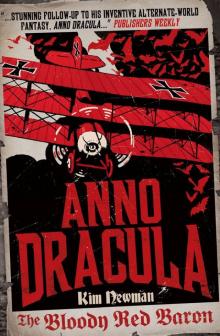 The Bloody Red Baron
The Bloody Red Baron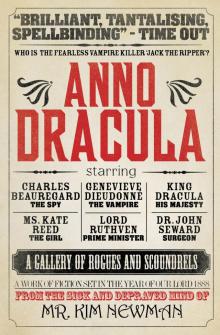 Anno Dracula
Anno Dracula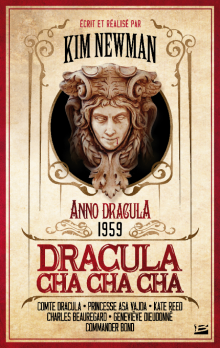 Dracula Cha Cha Cha
Dracula Cha Cha Cha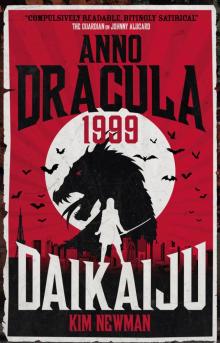 Anno Dracula 1999
Anno Dracula 1999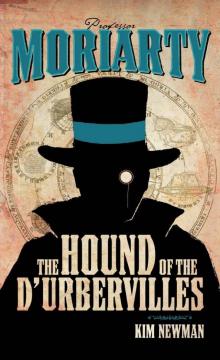 Moriarty: The Hound of the D'Urbervilles
Moriarty: The Hound of the D'Urbervilles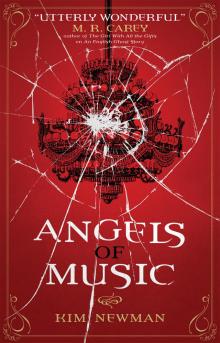 Angels of Music
Angels of Music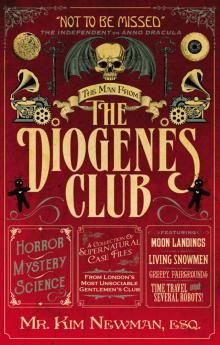 The Man From the Diogenes Club
The Man From the Diogenes Club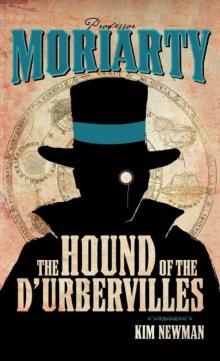 Professor Moriarty: The Hound Of The D’urbervilles
Professor Moriarty: The Hound Of The D’urbervilles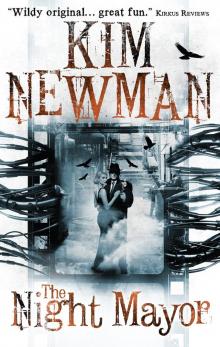 The Night Mayor
The Night Mayor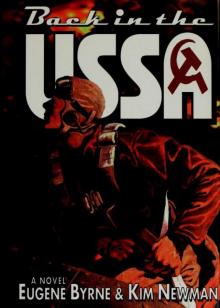 Back in the USSA
Back in the USSA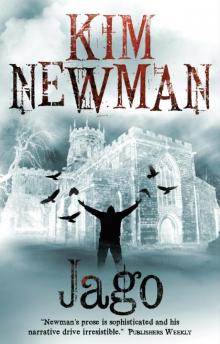 Jago
Jago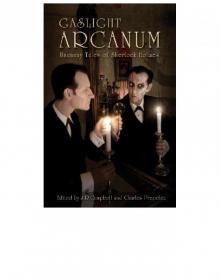 Gaslight Arcanum: Uncanny Tales of Sherlock Holmes
Gaslight Arcanum: Uncanny Tales of Sherlock Holmes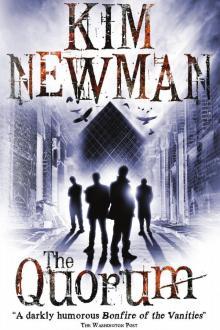 The Quorum
The Quorum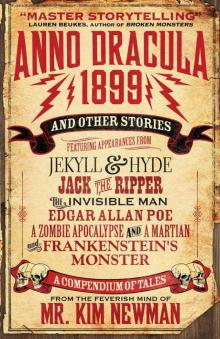 Anno Dracula 1899 and Other Stories
Anno Dracula 1899 and Other Stories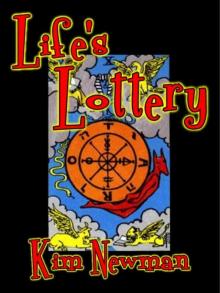 Life's Lottery
Life's Lottery The Secrets of Drearcliff Grange School
The Secrets of Drearcliff Grange School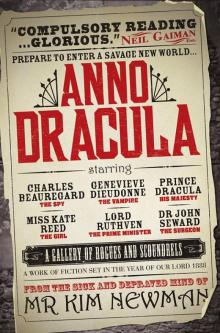 Anno Dracula ad-1
Anno Dracula ad-1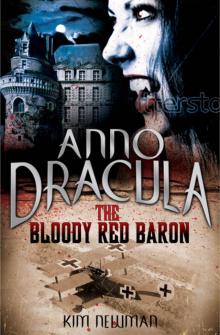 The Bloody Red Baron: 1918 ad-2
The Bloody Red Baron: 1918 ad-2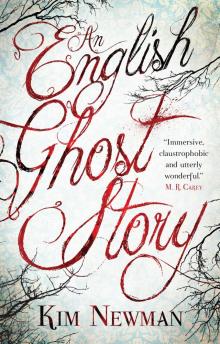 An English Ghost Story
An English Ghost Story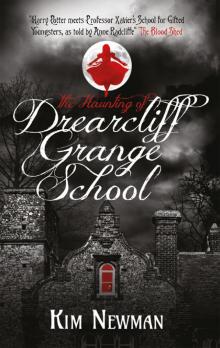 The Haunting of Drearcliff Grange School
The Haunting of Drearcliff Grange School The Other Side of Midnight
The Other Side of Midnight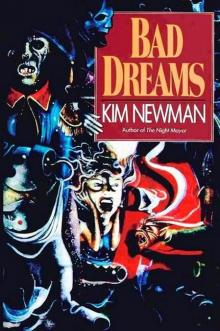 Bad Dreams
Bad Dreams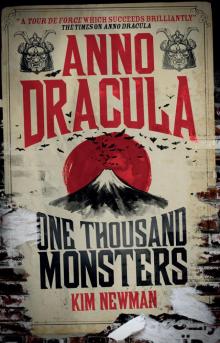 Anno Dracula--One Thousand Monsters
Anno Dracula--One Thousand Monsters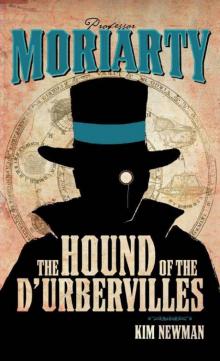 The Hound Of The D’urbervilles
The Hound Of The D’urbervilles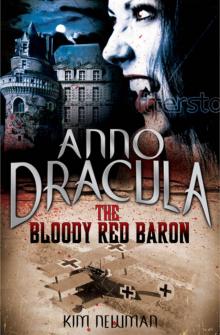 The Bloody Red Baron: Anno Dracula 1918
The Bloody Red Baron: Anno Dracula 1918